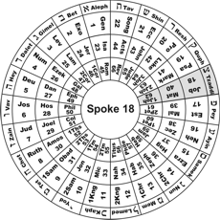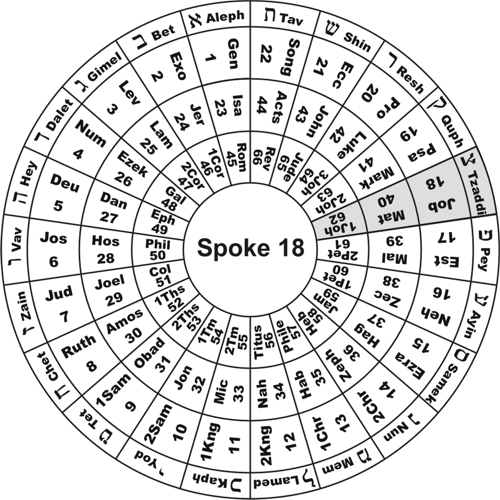Spoke 18 - Tsaddi - Three Witnesses for 1 John 5.7
For there are three that bear record in heaven,
the Father, the Word,
and the Holy Ghost: and these three are one.
1 John 5:7 (Spoke 18, Cycle 3)
And Jesus came and spake unto them, saying, All power is given unto
me in heaven and in earth. Go ye therefore, and teach all nations, baptizing them in
the name of the Father, and of the Son, and of the Holy Ghost: Teaching them to
observe all things whatsoever I have commanded you: and, lo, I am with you alway,
even unto the end of the world. Amen.
Matthew 28:18ff (Spoke 18, Cycle 2)
But if he will not hear thee, then take with thee one or
two more, that in the mouth of two or three witnesses every
word may be established.
Matthew 18:16 (Spoke 18, Cycle 2)
The rejection of 1 John 5.7 by the vast majority of modern scholars was pretty much
settled over a hundred years ago.
But the mystery of God is this - the Johannine Comma, as 1 John 5.7 is commonly called -
is linked with two extremely
significant KeyLinks to texts from the Book of Matthew. I will discuss the implications of this
after establishing the validity of the pattern.
I begin with the verse that forms the foundation of all
biblical hermeneutics:
But if he will not hear thee, then take
with thee one or two more, that in the mouth of two or
three witnesses every word
may be established.
Matthew 18:16 (Spoke 18,. Cycle 2)
Searching all seven versions for all verses that contain the set
(one, three, word) [Verify] yields exactly two verses in the KJV and NKJV, and
but one or none in each of the others. We have therefore, this Spoke 18 KeyLink based on the
content of 1 John 5.7, unique to the KJV text form:
 | KeyLink: Three Who Bear Witness
LinkSet (One, Three, Word) | Matthew 1 John 1 John |
This is internal evidence to the validity of 1 John 5.7. To really appreciate its significance, we must
meditate upon the text to which the Johannine Comma is linked, which declares that "in the mouth of
two or three witnesses every word may be established". If this is a mere coincidence, it is a very
strange one indeed. It is self-reflective and self-supporting because its
content reiterates the underlying reason why we should believe it. This is very much like the phrases
every word of God and
that ye may know and believe
which also constitute KeyLinks unique
to the KJV text form. This KeyLink is especially strong because it is actually a double KeyLink
that also links the
Inner Cycle of Matthew to Spoke 18 of the Bible Wheel, as discussed in the article
[Inner Cycles] > Matthew 18.
Yet there is more. There are two other words - heaven and witness - that
also appear in the immediate context
of both linked verses. This means that the KeyLink is actually based on a five word set. The
correlation is very deep, linking both the wordsets and the concepts, as shown here:
| Matthew 18.16f |
I John 5.7ff |
| But if he will not hear thee, then take with thee one or two more,
that in the mouth of two or three witnesses every word
may be established.
And if he shall neglect to hear them, tell it unto the church: but if he neglect
to hear the church, let him be unto thee as an heathen man and a publican.
Verily I say unto you, Whatsoever ye shall bind on earth shall be bound in heaven:
and whatsoever ye shall loose on earth shall be loosed in heaven. |
For there are three that bear record in heaven,
the Father, the Word, and the Holy Ghost:
and these three are one.
And there are three that
bear witness in earth, the Spirit,
and the water, and the blood: and these three agree in one.
If we receive the
witness of men, the witness of God is greater: for this
is the witness of God which
he hath testified of his Son. |
The context of 1 John 5.7 tells us what is going on here. I believe that these
KeyLinks are God's own witness to the validity of 1 John 5.7. This fits perfectly with the
supernatural design that governs the overall structure of Scripture. It should also be
noted that the KeyLinks between 1 John and Matthew 18 are actually double KeyLinks
because they also form links to Spoke 18 of the Inner Cycle of Matthew, as discussed in
the article .
Yet there is still more. The Comma is also linked
to another Scripture of primary significance, the
Great Commission, which itself is
fundamentally integrated with the meaning of Tsaddi.
As it
turns out, Matthew 28.16 and 1 John 5.7 are the only verses in all the
Bible to use the names of all three members of the Holy Trinity in a
single verse. Searching all seven
Warning: Undefined variable $version in /home/biblewhe/public_html/Wheel/Spokes/Tzaddi_Comma_Johanneum.php on line 119
for all verses
that contain the set (Father, Son/Word, Holy Ghost) [Verify] yields but two verses in the
KJV/NKJV and but one
in the each of the other five. We have therefore another fundamentally significant KeyLink between
Matthew and 1 John 5.7:
 | KeyLink: The Witness of the Holy Trinity
LinkSet (Father, Son/Word, Holy Ghost) | Matthew 1 John 1 John |
Again, why would God do such a thing? Doesn't this make the "scholars" look incredibly foolish? Indeed it does,
and this is what God declared He would do:
For the preaching of the cross is to them that perish foolishness; but
unto us which are saved it is the power of God. For it is written, I will destroy the wisdom
of the wise, and will bring to nothing the understanding of the prudent. Where is the wise?
where is the scribe? where is the disputer of this world? hath not God made foolish the wisdom
of this world? For after that in the wisdom of God the world by wisdom knew not God,
it pleased God by the foolishness of preaching to save them that believe. For the Jews
require a sign, and the Greeks seek after wisdom: But we preach Christ crucified,
unto the Jews a stumblingblock, and unto the Greeks foolishness; But unto them which are
called, both Jews and Greeks, Christ the power of God, and the wisdom of God. Because the
foolishness of God is wiser than men; and the weakness of God is stronger than men.
1 Corinthians 1.18f
Indeed, the witness and wisdom of God is infinitely greater than
that of men. And what are the rebellious scholars if not men who set themselves over and
above the very Word of God? I praise God for His supernatural wisdom that reveals the foolishness of such
men! Praise Him for His Wisdom and Truth!
|



